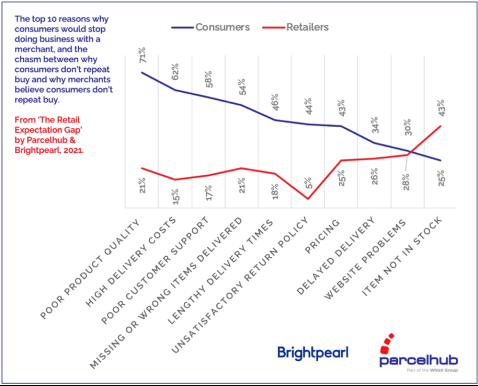Order fulfilment is the process of receiving, storing, picking, packing and distributing physical goods directly to consumers (B2C) or to businesses (B2B). The processes of order fulfilment can be carried out in-house by the retailer if order volume or space allows. Increasingly these processes are being outsourced by brands and retailers to specialist fulfilment houses.
Outsourced fulfilment specialists can operate in the same domestic country as the brand or be based overseas, helping the online brand mirror the performance of their overseas competitors.
In this article, we cover everything you need to know about order fulfilment so you can make an informed, educated decision as to whether fulfilment should be outsourced, managed in-house or adopt a hybrid fulfilment setup.
Why should businesses care about order fulfilment?
A recent study by Parcelhub, part of the Whistl Group, analysed the top 10 reasons why consumers would stop buying from an online retailer. The research discovered that merchants aren’t delivering what consumers demand, for example:
- 62% of consumers would stop doing business with a retailer due to high delivery costs
- 58% due to poor customer support
- 46% due to lengthy delivery times
- 43% due to items not in stock

Businesses should be mindful of the importance of effective order fulfilment. Getting it right is the difference between delivering an excellent customer experience, and losing customers before they’ve received their first delivery or even made their first purchase from you.
Getting fulfilment right means you can address 8 of the top 10 reasons why consumers wouldn’t buy from a retailer. Unfortunately, website problems and poor product quality are not things fulfilment specialists can help with, but all the rest can be optimised with an effective fulfilment strategy.
What does order fulfilment involve?
Taking 8 of the top 10 challenges as to why consumers would stop buying online; we can highlight each stage of the fulfilment journey and how it can help the retailer remedy them:
High delivery cost – Working with a fulfilment provider gives you access to collaborative buying power thanks to the shared shipping volumes of all other merchants working with the fulfilment house. This can help retailers minimise their shipping costs.
- Poor customer support – Some fulfilment companies offer complementary outsourced contact centre solutions to help the retailer better focus on their own core competencies, and enable them to cope with, and capitalise on peaks and troughs in demand.
- Missing or wrong items delivered – Working with a fulfilment company that really understands your product range, and has a high level of picking and packing accuracy, means you will minimise the chance of the wrong or missing item(s) arriving at your customer’s door.
- Lengthy delivery times – As an order fulfilment client, you will typically be given SLAs (service level agreements) to ensure your items are dispatched as quickly as possible, with the appropriate carrier partners. Your delivery options should be tailored to your product range and give online shoppers the ability to upgrade depending on their urgency.
- Unsatisfactory returns policy – Particularly for fashion retailers where returns rates are typically higher, a fulfilment provider should give the retailer the right level of delivery return options and technology to empower the retailer to offer a fair returns policy.
- Product pricing - Outsourcing fulfilment can save your business time and money, due to the space and skills on offer by the warehouse. By effectively managing inventory you will minimise over- and under-stocking, access discounted shipping rates, and the provider will evolve your picking and packing process overtime to make the whole process more efficient. These cost savings can trickle down to your product pricing, helping you stay more competitive.
- Delayed delivery – With failed deliveries costing mid-market retailers over £200,000 a year on average, effective fulfilment companies will utilise proactive technology to ensure any potential delivery issues are flagged before they lead to a delivery failure or WISMO (Where Is My Order?) query.
- Item not in stock – At Whistl we provide inventory management as well as traditional e-commerce fulfilment. This is a warehouse operations process that involves the flow of the items from the manufacturer to another location or final customer. Paired with your order management system (OMS) or warehouse management system (WMS) we can work with your suppliers to ensure you have the right amount of goods to satisfy demand.
What types of order fulfilment are there?
There are four distinct types of order fulfilment, and this relates to which party, or parties, carry out the storage and distribution.
In-house order fulfilment
With in-house order fulfilment, the retailer's own employees carry out the fulfilment processes in their own premises but may still work with a delivery management company to access discounted shipping rates. This format can be ideal for merchants who manage their inventory in-house and want total end-to-end control over the entire operation. As the business grows and more storage space is required, they may want to migrate to either outsourcing or a hybrid order fulfilment model.
Outsourced order fulfilment
Outsourcing order fulfilment with a third-party logistics company (3PL) is less capital-intensive than investing in one's own premises. With varying degrees of involvement, some businesses outsource their entire operations including customer service, storage, reworking and returns. In the early stages, a retailer will usually outsource one of these elements with a view to implementing other solutions as their business needs evolve.
Hybrid Fulfilment
Some retailers need to retain elements of their production in-house, such as bespoke and rarely sold items. The fulfilment house may lack the expertise to carry out such work and so the retailer could adopt a hybrid fulfilment model in which their fast-moving goods are handled by the 3PL, allowing the retailer to better focus on tailored customer orders. Other retailers may adopt a hybrid model to de-risk their expansion.
Dropshipping
Dropshipping is where the retailer simply generates an order and another retailer, or fulfilment house will fulfil the order on their behalf.
While typically less profitable than handling and selling your products, dropshipping is an increasingly popular fulfilment method that enables retailers to expand their product range to fill gaps in their market.
Dropshipping involves minimal risk for the retailer and is best suited to startups and retailers testing new suppliers in a way that they don’t need to commit any capital.
Order fulfilment challenges
When trying to manage fulfilment in-house, you will need to train up your staff on the various picking methods to ensure you are time efficient. Getting fulfilment wrong can break your business and having the right infrastructure in place is critical to ensure you can receive, handle, pack and deliver goods in a way that matches and exceeds your customers’ expectations.
Challenges can still occur when outsourcing or adopting a hybrid model but thanks to a fulfilment house’s exposure to, and experience of, diverse markets - they will have less learning to do. Resulting in fewer mistakes, meaning outsourcing remains a highly popular option for domestic and international online sellers.
How can Whistl help with order fulfilment?
When looking to outsource your order fulfilment, each online retailer is unique.
You may have a greater in-store presence than most, or your customers may prefer to buy from you via marketplaces. Your product range may be high value, time-critical, or low value and non-urgent and depending on your ideal customer profile, you may need to act faster than most – your customers may be harder to please than the norm.
However your business is shaped and whichever stage of growth you are in, Whistl has the experience, operations, technology, and scalability to help your business thrive.
Whistl's Complete Fulfilment Process
Click on an icon to learn more
-
Goods arrive at our fulfilment centre
-
Systems & Technology
-
Pick & Pack Service
-
Inventory Management
-
Dispatch & Distribution
-
Items Delivered
-
Returns Management
Join our mailing list
Sign up and receive all the latest industry news and insights directly to your inbox.
Research, Insights and Industry Guides
In depth insights and research studies to help you better understand customer perceptions & expectations.
Share this article
International Logistics Memberships and Accreditations

Contact us to find out more!
We'll help you find the right courier management software solutions for your business needs.
Call us
We'll call you
Complete our contact form



